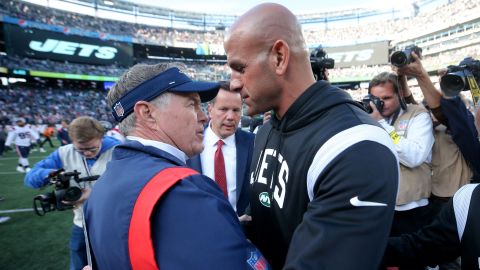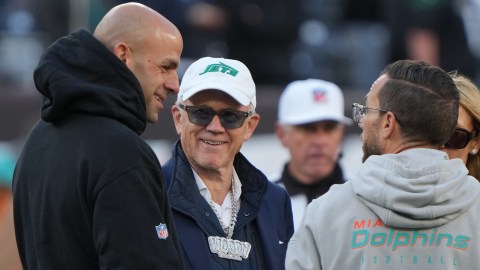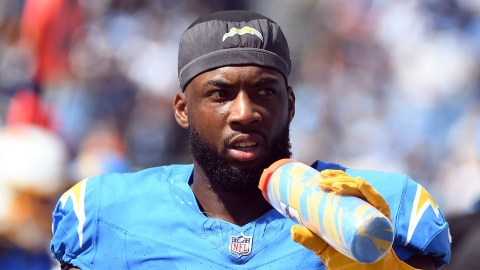 Over the next few weeks and months, you will hear, “The Jets should cut Mark Sanchez.” You will hear it repeated often because it’s an obvious sentiment. Usually, when players struggle and seem unfit for a backup role, they should be cut. Unfortunately, it isn’t that easy for Mike Tannenbaum. And the New York general manager has no one to blame but himself.
Over the next few weeks and months, you will hear, “The Jets should cut Mark Sanchez.” You will hear it repeated often because it’s an obvious sentiment. Usually, when players struggle and seem unfit for a backup role, they should be cut. Unfortunately, it isn’t that easy for Mike Tannenbaum. And the New York general manager has no one to blame but himself.
The Jets bizarrely chose to give Sanchez a contract extension back in March. The team added five years and $58.25 million onto the quarterback’s existing rookie deal. There was no reason for New York to do it at the time, and it looks even worse now that the team has benched Sanchez for the remaining two games of the 2012 season. Really, the only reason Tannenbaum gave Sanchez the new deal was to boost his confidence. Of course, that was all taken away as soon as the Jets traded for the most polarizing wildcat/backup quarterback/punt protector in NFL history, Tim Tebow, just weeks later.
The Jets can cut Sanchez, but it will cost them twice as much money off their cap than it would to just keep him as an expensive clipboard shelf. If New York cuts Sanchez, the Jets will still owe him his guaranteed $8.25 million 2013 salary. Plus, the remainder of his rookie contract bonus ($2.5 million) and his latest extension bonus ($6.4 million) accelerates onto the cap in 2013. That means Sanchez will take $17.153 million off New York’s cap just from getting cut, according to Jason Fitzgerald of NYJetsCap.com. If the Jets had not extended Sanchez, it would have only cost New York his $2.5 million remaining rookie bonus to cut him. So extending Sanchez was essentially a $15 million mistake. Yikes.
The Jets are already in deep trouble with their salary cap next season. As it stands, they have just 40 players under contract for 2013, and they’re $18 million over the salary cap. Cutting Bart Scott, Calvin Pace, Jason Smith and Eric Smith would put them $12 million under the cap. But if they chose to cut Sanchez, it would put them at just $3 million under the cap. And they would then need to sign 18 players just to fill their 53-man roster, and teams generally carry 90 players in training camp.
The Jets have two other options, but neither are great. One option is New York could designate Sanchez as its June 1 cut. We’ll let Fitzgerald break that down for us.
“What this does is hold off the signing bonus acceleration from future seasons until the following year,” said Fitzgerald via email. “In Sanchez’s case, what counts in 2013 would then be his guaranteed salary and the allocations in 2013 of the two bonuses. That would add up to $12,353,125. The remaining $4.8 million would be accounted for in 2014.”
So even if the Jets use that option on Sanchez, that still puts them at just $8 million under the salary cap. That would be enough to sign their seven 2013 draft picks and maybe one or two other cost-effective free agents.
The last option — and feel free to laugh — is to get some poor sucker to trade for Sanchez. In that situation, Sanchez’s bonuses ($8.9 million) would still be counted toward New York’s cap, plus the Jets would have to take on most of Sanchez’s remaining salary, which would then be added onto the salary cap hit. So even in a best case scenario (and dream world) where the Jets somehow find the dumbest general manager in all of sports to trade for Sanchez and agree to take on all of his guaranteed money, it would still cost New York more to trade Sanchez than it would to keep him. And since no team would ever accept his whole salary, the Jets would likely be charged at least $13.9 million on their salary cap if he’s traded.
The June 1 cut is the best choice for the Jets to take, but it’s far from perfect. They’ll still be taking a $4 million cap hit on top of Sanchez’s $8.25 million salary, plus delaying the inevitable to take the hit from the rest of his bonuses.
So why did New York extend Sanchez again? Oh yeah, because it gave him confidence. And that worked out really well.
The important thing to realize here is that this is all on Tannenbaum’s terrible decision to extend Sanchez. Rex Ryan was essentially forced to stick with Sanchez as long as possible to see if there was anything redeeming in him. Because if the Jets want to be fiscally responsible, they’ll need to keep him for another year.
If New York cuts or trades Sanchez, it will likely need to trade either Darrelle Revis or Antonio Cromartie just to fill its roster — even though those are the team’s best players. The 2012 Jets were bad, but the 2013 team is destined to be far worse.




